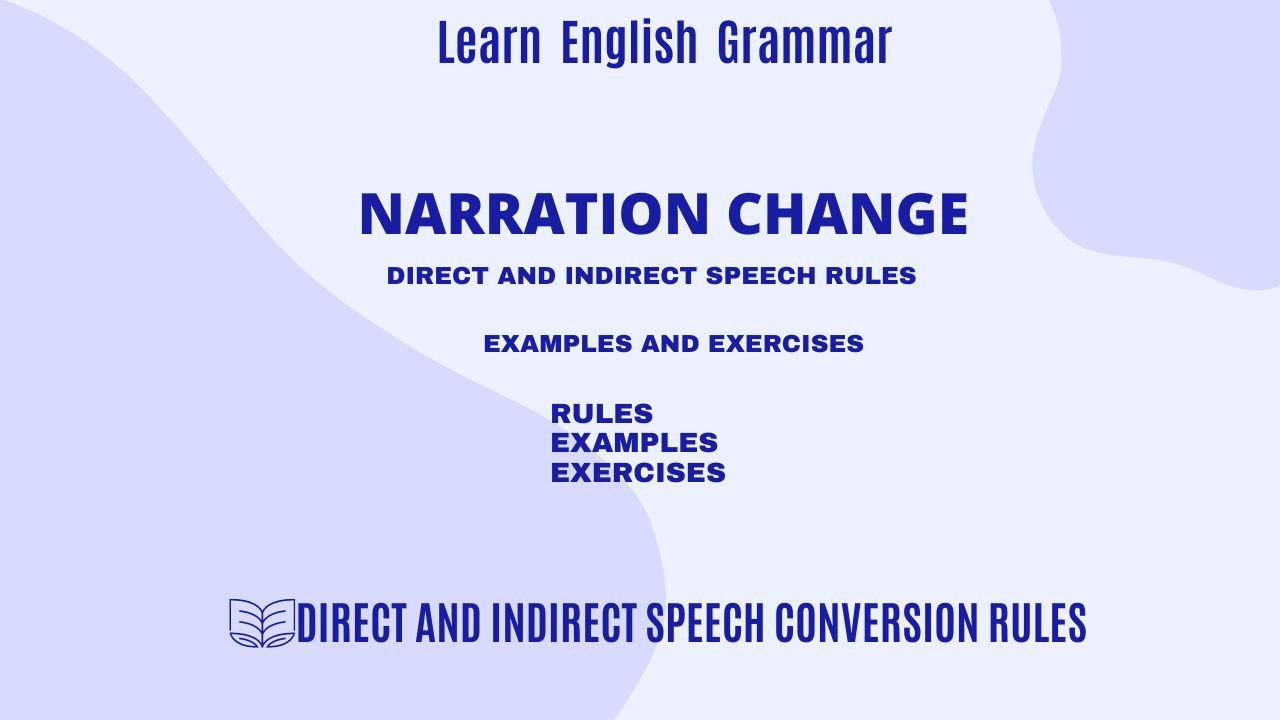Understanding Direct and Indirect Speech Rules for conversion is crucial for effective communication. This updated guide explains the key rules, including how to choose the right reporting verbs, handle tense changes, and accurately convert speech. With clear examples and practical tips, it’s an ideal resource for students, ESL learners, and exam preparation.
Direct Speech
Direct speech is a form of reporting that presents someone’s exact words without any alterations. It is commonly enclosed in quotation marks.
Direct Speech Rules
Direct speech consists of the following elements.
- The speaker (subject)
- reporting verb
- object( to whom the speaker says something)
- reported speech
- Quotation marks
- Punctuation placement (Commas, periods, question marks, and exclamation points)
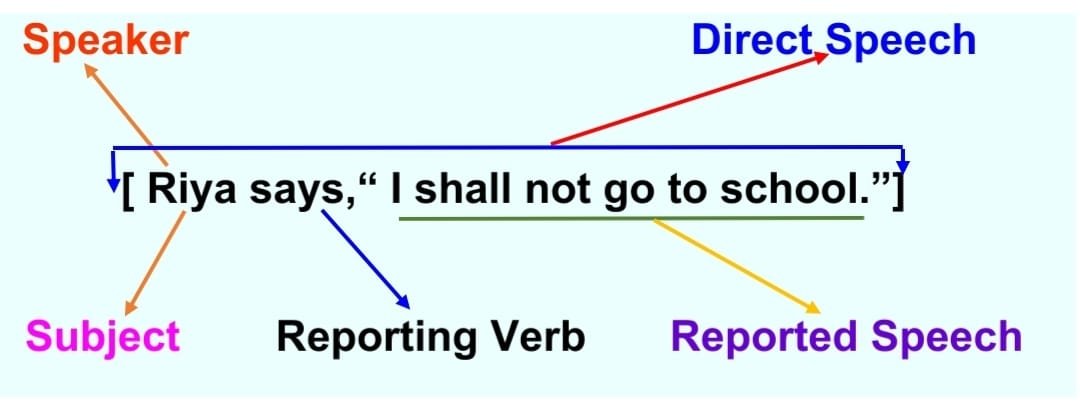
Explanation: “I shall not go to school,” are the exact words of Riya, enclosed in quotation marks/inverted commas (“….”). This format, which uses commas and quotation marks/inverted commas, is called direct speech. In this sentence, ‘Riya’ is the subject or speaker, ‘says’ is the reporting verb, and ‘I shall not go to school’ is the reported speech.
For examples,
- Direct: “We can’t be quite happy in life,” he said.
- Direct: He said, “The Muslims bury their dead.”
- Direct: “You’ve overcooked the steak again, Mary”, he said.
- Direct: Ramen said to Bina, “I’m going to your house this, week.”
- Direct: Ritu said, “I am going to the store.”
- Direct: “I can’t believe it,” she whispered, “but I saw a unicorn in the garden.”
People also ask
Indirect Speech
Indirect speech, on the other hand, involves paraphrasing someone’s words and reporting them indirectly, without using quotation marks. It requires a few changes in structure, such as tense and pronoun.
Indirect speech rules
- removing quotation marks
- changing pronouns
- adjusting tenses
- modifying time expressions
- making it into a statement
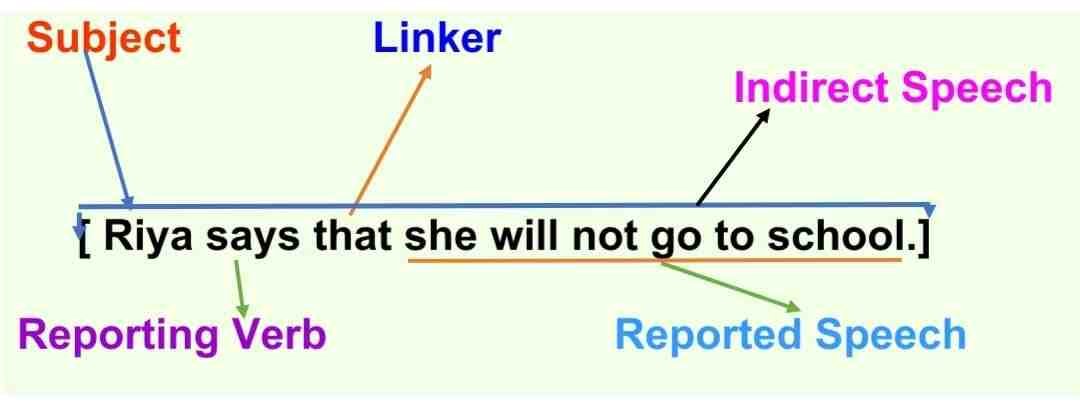
Similarly, we can report the above sentence without quoting Riya’s exact words while keeping the meaning the same. This format is called indirect speech. In this format, no commas or quotation marks/inverted commas are used; only a full stop (.) is used at the end of the sentence.
For examples,
Direct Speech: “We can’t be quite happy in life,” he said.
Indirect Speech: He said that they couldn’t be quite happy in life.
Direct Speech: He said, “The Muslims bury their dead.”
Indirect Speech: He said that the Muslims bury their dead.
Direct Speech: “You’ve overcooked the steak again, Mary”, he said.
Indirect Speech: He told Mary that she had overcooked the steak again.
Direct Speech: Ramen said to Bina, “I’m going to your house this, week.”
Indirect Speech: Ramen told Bina that he was going to her house that week.
Direct Speech: John said, “I am going to the store.”
Indirect Speech: John said that he was going to the store.
Direct Speech: “I can’t believe it,” she whispered, “but I saw a unicorn in the garden.”
Indirect Speech: She whispered that she couldn’t believe it but that she had seen a unicorn in the garden.
Rules between direct and indirect speech
The following comparison highlights the key differences between direct and indirect speech rules, including punctuation, tense changes, and adjustments to pronouns and time references.
| Points | Direct Speech | Indirect Speech |
|---|---|---|
| 1. Definition | Quotes the exact words spoken. | Reports the message without quoting exactly. |
| 2. Punctuation | Uses quotation marks (“…”). | No quotation marks are used. |
| 3. Tense | Tense stays the same as originally spoken. | Tense often shifts back (e.g., present to past). |
| 4. Pronouns | Pronouns remain the same. | Pronouns change to fit the reporting perspective. |
| 5. Time References | Time references remain unchanged. | Time references often change (e.g., “today” becomes “that day”). |
| Example 1 | She said, “I am going to the store.” John asked, “Can you help me?” | She said that she was going to the store. John asked if I could help him. |
Direct and Indirect Speech Rules for Conversion in General
Discover the essential rules of direct and indirect speech with a variety of examples to improve your language skills. Effortlessly understand the intricacies of converting statements, questions, and commands from one form to another.
Rule 1: Direct and Indirect Speech Rules for Reporting verbs ‘Say‘ and ‘Tell‘.
“Say” and “tell” are two frequently used reporting verbs. “Say” is generally followed by the reported speech, while “tell” is followed by the indirect object (the person being addressed).
Direct: He says, “I am your friend.”
Indirect: He says that he is your friend.
Direct: He said to me, “I’m going to the store.”
Indirect: She told me that he was going to the store.
Reporting verbs ‘Say’ and ‘Tell’ Chart
| Direct Speech | Indirect Speech |
| say | say |
| say to me | tell me |
| says to them | tells them |
| said | said |
| said to him | told him |
| shall/will say | shall/will say |
| shall/will say to her | shall/will tell her |
Rule 2: Direct and Indirect Speech Rules for reporting verb, ‘Ask‘ and ‘Inquire’
When reporting questions, “ask“ and “inquire“ are commonly employed reporting verbs.
Direct: He said to me, “Where are you going?”
Indirect: He asked where I was going.
Direct: She said, “When will the concert start?”
Indirect: She inquired, “When will the concert start?”
Direct: Sarah said, “What time does the movie start?”
Indirect: Sarah asked what time the movie started.
Direct: “Could you please provide more details?” she said to me.
Indirect: She inquired politely if I could provide more details.
Direct: The customer said, “Do you have this item in stock?”
Indirect: The customer inquired if that item had in stock.
Rule 3: Direct and Indirect Speech Rules for reporting verb, “Request“, “Advise“, “Order“, “Beg“.
To report imperative sentences, “Request”, “Advise”, “Order”, and “beg” are often used.
Direct: “Please close the door,” she said.
Indirect: She requested that the door be closed.
Direct: “You should study regularly,” he said.
Indirect: He advised that regular studying should be done.
Direct: “Stand up straight,” the sergeant said.
Indirect: The sergeant ordered that they stand up straight.
Direct: He said to me, “Go home at once”
Indirect: He ordered me to go home at once.
Direct: She said, “Do not run in the sun”
Indirect: She advised not to run in the sun.”
Direct: “Please forgive me,” she said.
Indirect: She begged for forgiveness.
Rule 4: Direct and Indirect Speech Rules for Present Tense
If the Reporting Verb is in the Present Tense, there is no change in the tense in the Reported Verb when Direct Speech is converted into Indirect Narration.
Examples:
Direct: Arnab says, “The room is dark.”
Indirect: Arnab says that the room is dark.
Direct: Arnab says, “The room was dark.”
Indirect: Arnab says that the room was dark.
Direct: Arnab says, “I shall finish the work.”
Indirect: Arnab says that he will finish the work.
Direct: Mary says, “I am going to the party.”
Indirect: Mary says that she is going to the party.
Direct: He tells us, “I will finish the project by tomorrow.”
Indirect: He tells us that he will finish the project by tomorrow.
Rule 5: Direct and Indirect Speech Rules for Conversion of Future Tense
If the Reporting Verb is in the Future Tense, there is no change in the tense in the Reported Verb when Direct Speech is converted into Indirect Narration.
Examples:
Direct: Sarah will say, “I am going to the store.”
Indirect: Sarah will say that she is going to the store.
Direct: John will say, “I have completed the assignment.”
Indirect: John will say that he has completed the assignment.
Direct: Arnab will say, “The room is dark.”
Indirect: Arnab will say that the room is dark.
Direct: Arnab will say, “The room was dark.”
Indirect: Arnab will say that the room was dark.
Direct: Arnab will say, “I shall finish the work.”
Indirect: Arnab will say that he will finish the work.
Rule 6: Rules for Transforming Direct and Indirect Speech of Past Tense
If the Reporting verb of the Direct Narration is in the Past Tense, the Present Tense of the Verb in the Reported Speech of Direct Narration is changed into the corresponding Past Tense in Indirect Narration.
| Reporting Verb | Reported Verb in Direct Speech | Reported speech Verb in Indirect Speech |
| Past Ex: He said, | Present Indefinite ” I love you” | Past Indefinite He said that he loved me. |
| Past Ex: The teacher said, | Universal Truth or Regular Habits ” The sun rises in the east.” | Remains Unchanged The teacher said that the sun rises in the east. |
| Past Ex: She said, | Present Continuous ” I am singing a song.” | Past Continuous She said that she was singing. |
| Past Ex: Mother said, | Present Perfect ” I have finished cooking.” | Past Perfect Mother said that she had finished cooking. |
| Past Ex: Maria said, | Past Indefinite “You did the work.” | Past Perfect Maria said that I had done the work. |
| Past Ex: Soumen said, | Past Continuous ” I was playing football.” | Past Perfect Continuous Soumen said that he had been playing football. |
| Past Ex: Ravvi said, | Past Perfect ” You had insulted me.” | Remains Unchanged Ravi said that I had insulted him. |
| Past Ex: They said, | Shall/Will “We shall help him.” | Should/Would They said that they would help him. |
| Past Ex: Doctor said, | Can / May ” You can do it.” | Could / Might The doctor said that I could do it. |
Examples:
Direct: Rohan said, “She works hard.”
Indirect: Rohan said that she worked hard.
Direct: Rohan said, “She is singing a song.”
Indirect: Rohan said that she was singing a song.
Direct: The guest said shouting, “We have arrived .”
Indirect: The guest shouted that they had arrived.
Direct: My sister said, “It has been raining hard for 3 days”.
Indirect: My sister said that it had been raining hard for 3 days.
Direct: Father said, “I visited the Taj yesterday.”
Indirect: Father said that he had visited the Taj the previous day.
Direct: The boys said, “They were traveling in the park.”
Indirect: The boys said that they had been traveling in the park.
Direct: The reporters commented, “The Kohinoor had been lost long ago”.
Indirect: The reporters commented that the Kohinoor had been lost long ago.
Direct: Jyotsna said, “ She had been doing the work for 3 hours”.
Indirect: Jyotsna said that she had been doing the work for 3 hours.
Rule: 7 Direct and Indirect Speech Rules for Universal Truth or Habitual Fact or Scientific Truth.
The Tense of the Verb remains unchanged in Indirect Narration in cases of General Statements of Facts, Universal Truths, Commonplace Occurrences, and Habitual or Repeated Actions. No real change occurs in these cases. Only there will be present Tense alone.
Examples:
Direct: The boy said to his mother, “ The sun rises in the East”.
Indirect: The boy told his mother that the sun rises in the East. [ Universal Truth ]
Direct: The monk answered, “ Man is mortal”.
Indirect: The monk answered that man is mortal. [ Universal Truth ]
Direct: The teacher told the students, “ Perseverance always leads to success.”
Indirect: The teacher told the students that perseverance always leads to success.
Rule 8: Direct and Indirect Speech Rules for Personal Pronouns (I, We, You, He, She, They)
First Person
(a) If the subject of the reported speech of direct form is in the first person, the subject of the reported speech will be replaced by the subject of the reporting verb in indirect form, but the number must be the same. [ singular > singular and plural > plural ]
Examples:
Direct: She says, “I am ill today.”
Indirect: She says that she is ill that day.
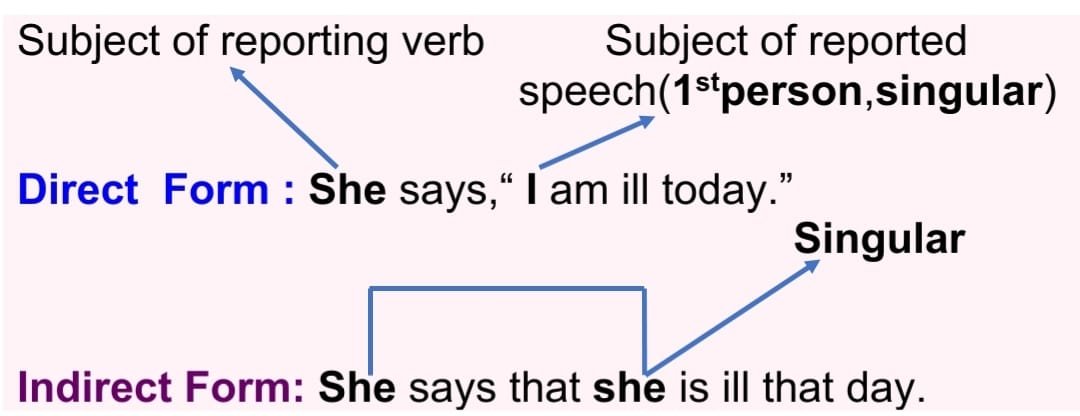
Second Person
(b) If the subject of the reported speech in the Direct Form is in the second person, the subject of the reported speech will be replaced by the object of the reporting verb in the indirect form, but the number must be the same. [ singular > singular and plural > plural ]
Example:
Direct: He says to me, ” You can do this work.”
Indirect: He tells me that I can do that work.
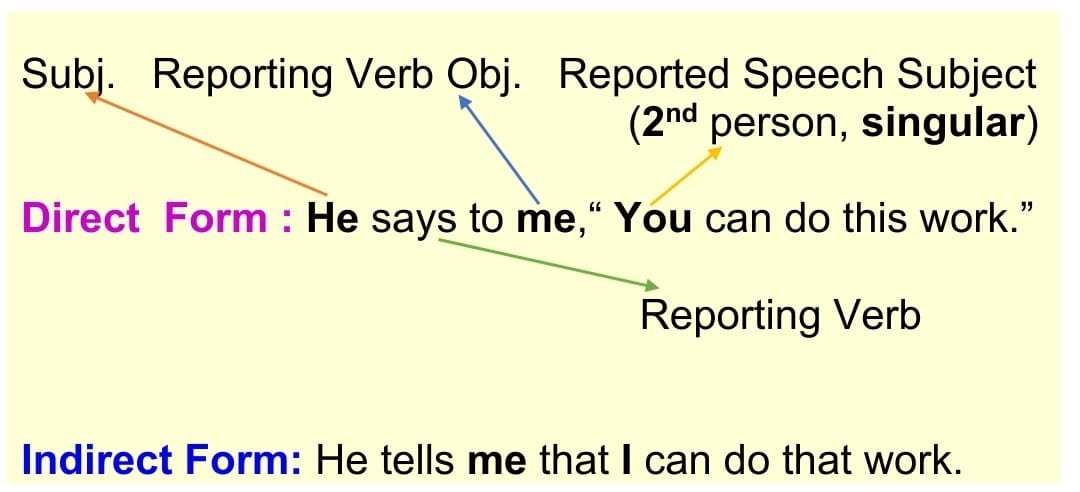
Third Person
(c) If the subject of the reported speech of Direct Form is in the third person, there will be no change in the person of the Indirect Form.
Direct: I said, “He will not wait for his friend.”
Indirect: I said that he would not wait for his friend.
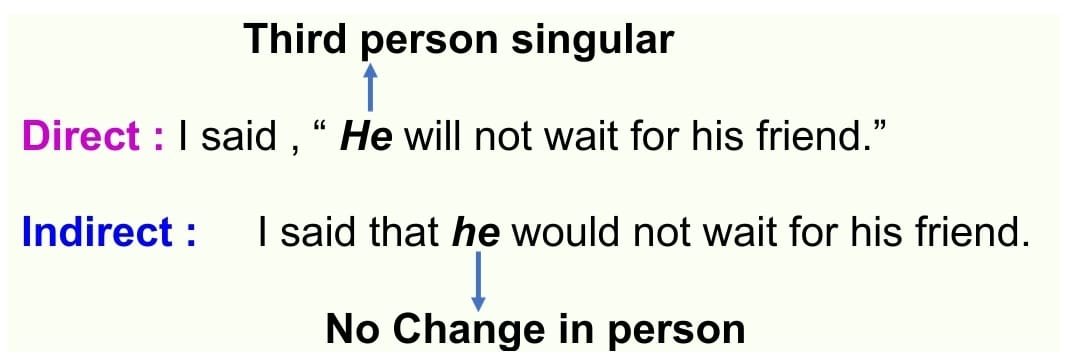
Pronouns Chart: direct and indirect speech rules
| Subject | Object |
| I (1st person, singular) | me (1st person, singular) |
| We (1st person, plural) | us (1st person, plural) |
| You (2nd person, singular / plural) | You (2nd person, singular / plural) |
| He (3rd person, singular) | him (3rd person, singular) |
| She (3rd person, singular) | her (3rd person, singular) |
| They (3rd person, plural) | them (3rd person, plural) |
Rule 9: Direct and Indirect Speech Rules for Demonstrative Pronouns (This, That)
In the case of demonstrative pronouns, replace them with appropriate pronouns in indirect speech.
Example:
Direct: “This is my book,” she said.
Indirect: She said that this was her book.
Rule 10: Direct and Indirect Speech Rules for Commas with Reporting Verb
When introducing indirect speech with a reporting verb, use a comma to separate the reporting verb from the reported speech.
Example: She said, “I’ll be there on time.”
Rule 11: Direct and Indirect Speech Rules for Question Mark to Full Stop
If the direct speech is a question, change the question mark to a full stop when converting to indirect speech.
Example:
Direct: He asked, “Are you coming to the party?”
Indirect: He asked if I was coming to the party.
Rule 12: Direct and Indirect Speech Rules for Exclamation Mark to Full Stop
In cases where the direct speech has an exclamation mark, replace it with a full stop in indirect speech.
Example:
Direct: She exclaimed, “What a beautiful day!”
Indirect: She exclaimed that it was a beautiful day.
Rule 13: Direct to Indirect Speech Conversion Rules of Modal Verbs
When dealing with modals like can, could, will, would, may, might, shall, should, must, etc., use the appropriate past form in indirect speech.
Direct: She said, “You should respect your elders.
Indirect: She said that I should respect my elders.
Direct: She said, “I can speak French fluently.
Indirect: She said that she could speak French fluently.
Direct: May I borrow your pen?” she asked.
Indirect: She asked if she might borrow my pen.
Direct: He said, “You must complete the assignment by tomorrow.
Indirect: He said that I must complete the assignment by the next day.
Rule 14: Direct to Indirect Speech Conversion Rules of Conditional Sentences
In indirect speech, conditional sentences undergo specific changes, especially when they involve “will” or “would.”
Direct: He said, “I will help you.”
Indirect: He said that he would help me.
Direct: He said, “I will help you with your project
Indirect: He said that he would help me with my project.
Rule 15: Reporting Direct to Indirect Speech Conversion Rules of Adverbs of Time
When using adverbs of time in indirect speech, adjust them to match the new timeframe.
Example:
Direct: “I will come tomorrow,” she said.
Indirect: She said that she would come the next day.
Rule 16: Direct to Indirect Speech Conversion Rules of Adverbs of Place
Similar to adverbs of time, adverbs of place need modification in indirect speech.
Example:
Direct: ” I live here,” he said.
Indirect: He said that he lived there.
Rule 17: Direct to Indirect Speech Conversion Rules of Adverbs of Manner
We can also use Adverbs of manner in indirect speech, requiring appropriate adjustments.
Example:
Direct: “He ran quickly,” she said.
Indirect: She said that he ran quickly.
Rule 18: Time, Place, Manner, Distance, Direction Chart for Direct and Indirect Speech
In Indirect Narration, words denoting Time, Place, Manner, Distance, and Direction used in the quoted speech are correspondingly changed to conform to the point of view of the Reporter. Thus, the sense of nearness is changed into that of Distance, and so on.
Time Chart
| Direct Narration | Indirect Narration |
| now | then /at that time |
| ago | before |
| henceforth | thenceforth |
| long ago | long before |
| henceforward | thenceforward |
| today | That day /the same day |
| tonight | that night /the same night |
| tomorrow | the next day /the following day |
| yesterday | the previous day /the day before |
| yesterday night | the previous night /the night before |
| last night | the previous night /the night before |
| last evening | the previous evening /the evening before |
| last week | the previous week /the week before |
| last fortnight | the previous fortnight /the fortnight before |
| last month | the previous month /the month before |
| last year | the previous year /the year before |
| last occasion | the previous occasion |
| next day | the following day /the day after |
| next week | the following week /the week after |
| next fortnight | the following fortnight /the fortnight after |
| next month | the following month /the month after |
| next year | the following year /the year after |
| on the next occasion | on the following occasion |
Place Chart
| Direct Narration | Indirect Narration |
| here | there |
| at this place | at that place |
Manner Chart
| Direct Narration | Indirect Narration |
| thus | so /in that way |
| in this way | in that way |
| in this manner | in that manner |
| hereby | thereby |
Distance Chart
| Direct Narration | Indirect Narration |
| this | that |
| these | those |
Direction Chart
| Direct Narration | Indirect Narration |
| hither | thither |
| hence | thence |
| From here | From there |
Rule 19: Direct and Indirect Speech Conversion Rules for Assertive Sentences
To convert Assertive sentences into indirect speech the following rules are applied.
(a) No comma and Inverted comma in Indirect Speech, only full stop at the end.
(b) Reporting Verbs changed from Direct Speech to Indirect Speech; ‘say – say’, ‘says – says’, ‘said – said’, ‘said to – told’, ‘say to – tell’, ‘says to – tells’.
(c) Connective ‘that’ added before Reported Speech in indirect Narration.
Example:
Direct: He said to me, “I am ill.”
Indirect: He told me that he was ill.
Direct: Mary said, “I am happy with my results.”
Indirect: Mary said that she was happy with her results.
Direct: Tom said, “I will attend the meeting tomorrow.”
Indirect: Tom said that he would attend the meeting the next day.
Direct: Alice said, “I have finished my homework.”
Indirect: Alice said that she had finished her homework.
Direct: David said, “We are planning a trip to the mountains.”
Indirect: David said that they were planning a trip to the mountains.
Rule 20: Direct and Indirect Speech Conversion Rules for Interrogative sentences
Forming indirect speech with questions necessitates some adjustments:
a. Reporting Yes/No Questions rules
When reporting yes/no questions, use “if” or “whether” and invert the subject and auxiliary verb in indirect speech.
Example:
Direct: John asked, “Are you coming to the party?”
Indirect: John asked if I was coming to the party.
Direct: Sarah asked, “Do you like chocolate?”
Indirect: Sarah asked if I liked chocolate.
Direct: Mike asked, “Have you finished your project?”
Indirect: Mike asked if I had finished my project.
Direct: Emma asked, “Will you help me with my homework?”
Indirect: Emma asked if I would help her with her homework.
Direct: “Will you be there?” he asked.
Indirect: He asked if I would be there.
b. Reporting Wh-Questions rules
For reporting wh-questions, maintain the question word and adjust the word order in indirect speech.
(a) ‘Tell’ and ‘say’ in Direct Narration are changed to ‘ask’, ‘enquire of’, ‘question’, ‘want to know’ etc. in Indirect Narration.
(b) In place of introductory ‘that’. ‘if’ or ‘whether’ should be used.
(c) In Indirect Narration a full stop (.) must be put in place of a question mark(?) at the end of the sentence.
(d) In Direct Narration the Reported Speech begins with W-word or how, in Indirect Narration the same Wh-word or how is retained.
Example:
Direct: Lisa asked, “Where are you going?”
Indirect: Lisa asked where I was going.
Direct: Mark asked, “What time does the movie start?”
Indirect: Mark asked what time the movie started.
Direct: Jennifer asked, “Why did you leave early?”
Indirect: Jennifer asked why I had left early.
Direct: Tom asked, “How do you solve this problem?”
Indirect: Tom asked how I solved that problem.
Direct: “Where are you going?” she asked.
Indirect: She asked where I was going.
Direct: The teacher said to me, “Why are you late?”
Indirect: The teacher asked me why I was late.
Rule 21: Imperative Sentences Rules for shifting Direct and Indirect Speech
The indirect speech also involves reporting imperatives, which are commands, requests, or advice:
Reporting Commands
When reporting commands, use the reporting verb “tell” and change the imperative verb to the corresponding infinitive.
Example:
Direct: The teacher said, “Open your books.”
Indirect: The teacher told the students to open their books.
Reporting Requests
For reporting requests, employ the reporting verb “ask” and convert the imperative verb to the corresponding infinitive.
Example:
Direct: She said, “Please help me with this.”
Indirect: She asked for help with that.
(a) Reporting verbs of Direct Speech changed into order or command, advise, or request according to sense in Indirect Speech.
(b) ‘To’ is placed before Reported speech in Indirect Narration; for the negative imperative sentence ‘not to’ is used.
(c) ‘not to’ can also be replaced by ‘forbid’, or ‘prohibit’.
(d) ‘Let’ implies ‘suggestion’ or ‘proposal’; Reporting verb will be ‘suggest’ or ‘propose’ in Indirect Speech. ‘that’ is used before Reported speech in Indirect Narration
(e) ‘Let’ without ‘suggestion’ or ‘proposal’; Reporting verb will be ‘tell’, or ‘wish’ according to sense in Indirect Speech. ‘that’ is used before Reported speech in Indirect Narration.
Example:
Direct: Mother said to me, “Don’t run in the sun.”
Indirect: Mother advised me not to run in the sun.
Direct: She said to me, “Let us go for a picnic.”
Indirect: She suggested that we should go for a picnic.
Rule 22: Optative Sentences Rules Converting Direct into Indirect Speech
The following rules are used to change an optative sentence from direct speech to indirect speech
(a) Reporting verbs changed to ‘wish’, ‘pray’, and ‘bless’ in Indirect Speech.
(b) Linker, ‘that’ is placed before Reported speech in Indirect Narration.
Example:
Direct: The monk said to me, “ May God bless you.”
Indirect: The monk wished that God might bless me.
Rule 23: Exclamatory Sentences Rules Transforming Direct to Indirect Speech
(a) The reporting verb is changed into exclaim (in joy), exclaim (in grief), cried out (in sorrow), pray, wish, etc.
(b) Examinations are turned into statements.
(c) Interjections (Alas, Oh, Hurrah) are omitted.
(d) ‘What’, and ‘How’ used in exclamation should be replaced by great, great, very, very much, and big.
Example:
Direct: The boys said, “Hurrah! we have won the match.”
Indirect: The boy exclaimed in joy that they had won the match.
Solved Exercises Direct and Indirect Speech following rules
Change the following sentences into indirect speech.
Q: Ratan said to Anita, “I don’t like your brother”.
Ans: Ratan told Anita that she did not like her brother.
Q: The hermit said to the boys, “God is present everywhere.”
Ans: The hermit told the boys that God is present everywhere.
Q::He said to you, “You shouldn’t play in my garden.”
Ans: He told you that you should not play in his garden.
Q: The class teacher said to the students. “The inspector will visit our school today.”
Ans: The class teacher told the students that the inspector would visit their school that day.
Q: He said to me, “I don’t believe you.”
Ans: He told me that he didn’t believe me.
Q: She said to her son, “I’ve often told you not to play with fire.”
Ans: She told her son that she had often told him not to play with fire.
Q: Sitesh said to Lina, “I want you to go to Patna with me.”
Ans: Sitesh told Lina that he wanted her to go to Patna with him.
Q: “We can’t be quite happy in life,” he said.
Ans: He said that they couldn’t be quite happy in life.
Q: He said, “The Muslims bury their dead.”
He said that the Muslims bury their dead.
Q: “You’ve overcooked the steak again, Mary”, he said.
Ans: He told Mary that she had overcooked the steak again.
Q: Ramen said to Bina, “I’m going to your house this, week.”
Ans: Ramen told Bina that he was going to her house that week.
Q: He said, “We will discuss this tomorrow.”
Ans: He said that they would discuss that the next day
Turn the following sentences into direct speech.
Q: He said to me, “You are wicked; so I shall not mix with you.”
Ans: He told me that I was wicked; so he would not mix with me.
Q: He said to you, “I was much struck by your eloquence.”
Ans: He told you that he had been much struck by your eloquence.
Q: We remarked, “God is gracious.”
Ans: We remarked that God is gracious.
Q: I said to my mother, “I shall always obey you.”
Ans: I told my mother that I should always obey her.
Q: He said to Gopal, “You were a mere boy when I saw you last.”
Ans: He told Gopal that he was a mere boy when he had seen him last.
Q: I said to him, “The sky is blue.”
Ans: I told him that the sky is blue.
Q: He said to me, “You will feel the consequences.”
Ans: He told me that I should feel the consequences.
Q: She said to you, “I am not angry with you.”
Ans: She told you that she was not angry with you.
Q: I said to them, “You have done wrong.”
Ans: I told them that they had done wrong.
Q: He said, “I visit the temple every day.”
Ans: He said that he visited the temple every day.
Direct and Indirect Speech Sample MCQ Questions Answers
Fill in the blanks with proper Direct and Indirect Speech Rules
- Direct: He said, “I am learning French.”
- Indirect: He said that he ___ learning French.
- a) was
- b) is
- c) will be
- d) had been
- Answer: a) was
- Indirect: He said that he ___ learning French.
- Direct: She asked, “Do you like pizza?”
- Indirect: She asked if I ___ pizza.
- a) liked
- b) like
- c) will like
- d) had liked
- Answer: a) liked
- Indirect: She asked if I ___ pizza.
- Direct: They said, “We will visit Paris next year.”
- Indirect: They said that they ___ Paris the following year.
- a) will visit
- b) would visit
- c) visit
- d) had visited
- Answer: b) would visit
- Indirect: They said that they ___ Paris the following year.
- Direct: John asked, “Where are you going?”
- Indirect: John asked where I ___ going.
- a) am
- b) were
- c) was
- d) had been
- Answer: c) was
- Indirect: John asked where I ___ going.
- Direct: Mary said, “I have finished my homework.”
- Indirect: Mary said that she ___ finished her homework.
- a) has
- b) had
- c) will have
- d) is
- Answer: b) had
- Indirect: Mary said that she ___ finished her homework.
- Direct: Peter asked, “Can you help me?”
- Indirect: Peter asked if I ___ help him.
- a) can
- b) could
- c) will
- d) would
- Answer: b) could
- Indirect: Peter asked if I ___ help him.
- Direct: The teacher said, “The Earth revolves around the Sun.”
- Indirect: The teacher said that the Earth ___ around the Sun.
- a) revolves
- b) revolve
- c) revolved
- d) is revolving
- Answer: a) revolves
- Indirect: The teacher said that the Earth ___ around the Sun.
- Direct: She said, “I was sleeping when you called.”
- Indirect: She said that she ___ sleeping when I called.
- a) was
- b) had been
- c) is
- d) will be
- Answer: b) had been
- Indirect: She said that she ___ sleeping when I called.
- Direct: He said, “I will be there by noon.”
- Indirect: He said that he ___ be there by noon.
- a) will
- b) would
- c) is
- d) had
- Answer: b) would
- Indirect: He said that he ___ be there by noon.
- Direct: They asked, “Why are you late?”
- Indirect: They asked why I ___ late.
- a) am
- b) are
- c) was
- d) had been
- Answer: c) was
- Indirect: They asked why I ___ late.
FAQs: Direct and Indirect Speech
Q : What is the key difference between direct and indirect speech?
Ans: The main difference lies in the quoting style. Direct speech involves repeating someone’s exact words, while indirect speech reports what was said without quoting verbatim.
FAQ 2: Is it always necessary to backshift the tense in indirect speech?
Ans: While backshifting is common, some exceptions exist, especially in cases where the statement’s truth remains constant.
FAQ 3: How do I handle multiple speakers in indirect speech?
Ans: When reporting multiple speakers, use appropriate reporting verbs and introduce each person’s dialogue in a logical sequence.
FAQ 4: Can I mix direct and indirect speech in the same sentence?
Ans: Combining direct and indirect speech in a sentence is possible, but it requires precision to avoid confusion.
FAQ 5: What are some reporting verbs commonly used in indirect speech?
Ans: Reporting verbs like “said,” “told,” “asked,” “claimed,” and “explained” are frequently employed.
FAQ 6: How can I ensure my writing maintains a natural flow when switching between direct and indirect speech?
Ans: Focus on maintaining consistency in style and verb tense to ensure a smooth transition between direct and indirect speech.
FAQ 7: How do I identify direct and indirect speech in a sentence?
Ans: Direct speech is usually enclosed within quotation marks and directly quotes someone’s words. Indirect speech, on the other hand, reports those words without quotation marks, often using reporting verbs like “said,” “told,” “asked,” etc.
FAQ 8: Can reporting verbs change the meaning of indirect speech?
Ans: Yes, the choice of reporting verbs can convey the speaker’s attitude or emotions towards the reported speech. Different reporting verbs can modify the meaning slightly.
FAQ 9: What are the common reporting verbs for indirect speech?
Ans: Common reporting verbs for indirect speech include “say,” “tell,” “ask,” “inquire,” “explain,” “describe,” and more.
FAQ 10: How do I change tenses in indirect speech?
Ans: The tense in indirect speech is generally shifted back one step. For example, present simple becomes past simple, present continuous becomes past continuous, and so on.
FAQ 11: Is it essential to use quotation marks in indirect speech?
Ans: No, quotation marks are not used in indirect speech as they report the speech without directly quoting it.
FAQ 12: Can you give an example of indirect speech in narratives?
Ans: Certainly! In the story, he said, “I love you,” to which she replied that she loved him too.
FAQ 14: Can we omit the reporting verb in indirect speech?
Ans: It is possible to omit the reporting verb in some cases, especially in informal contexts, but including it adds clarity and structure to the reported speech.
FAQ 15: Do all tenses change in indirect speech?
Ans: Most tenses change in indirect speech, but the changes depend on the context and the tense of the original statement.
FAQ 16: Can you provide more examples of direct and indirect speech transformations?
Ans: Certainly! Here are a few more examples:
Direct: “I am reading a book,” she said. Indirect: She said that she was reading a book.
Direct: “We have completed the project,” they exclaimed. Indirect: They exclaimed that they had completed the project.
FAQ 17: How can I practice using direct and indirect speech effectively?
Ans: Practice by converting direct speech to indirect speech and vice versa using various reporting verbs, tenses, and pronouns. Additionally, read books or articles and identify the reported speech used by the authors.

